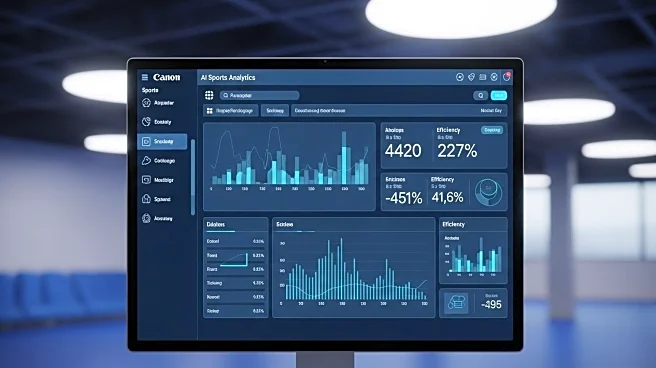What's Happening?
College athletic programs are increasingly turning to artificial intelligence (AI) to gain competitive advantages in sports. AI is being utilized to improve communication, off-the-field performance, and recruiting efficiencies. The technology helps coaches and athletic directors maximize resources by analyzing video footage more efficiently and customizing solutions to meet specific team needs. AI also aids in managing student-athletes' academic and personal responsibilities, providing a centralized platform for monitoring nutrition, classwork, and schedules. This integration is part of a broader trend where athletic departments seek technological solutions to enhance their programs.
Why It's Important?
The use of AI in college athletics is significant as it represents a shift towards more data-driven and efficient management of sports programs. This technology can potentially lead to better performance outcomes, as teams can identify strengths and weaknesses more quickly and accurately. Additionally, AI's role in recruiting can streamline the process, allowing coaches to find ideal candidates faster. The financial implications are also notable, as the deregulation of name, image, and likeness (NIL) restrictions has increased spending in college sports, making the return on investment crucial. AI offers a way to ensure that investments in athletic programs yield tangible results.
What's Next?
As AI continues to be integrated into college athletics, we can expect further advancements in how teams prepare and compete. Athletic departments may increasingly partner with technology firms to develop customized AI solutions tailored to their specific needs. The focus will likely be on refining AI's capabilities in video analysis and recruiting, as well as expanding its role in managing student-athletes' academic and personal lives. Stakeholders, including coaches, athletic directors, and investors, will be closely monitoring the impact of AI on performance and financial returns.
Beyond the Headlines
The ethical implications of AI in sports, particularly concerning privacy and data usage, may become a topic of discussion. As AI systems gather and analyze vast amounts of data, ensuring that this information is used responsibly and ethically will be crucial. Additionally, the cultural shift towards technology-driven sports management may influence how future generations of athletes are trained and developed.









